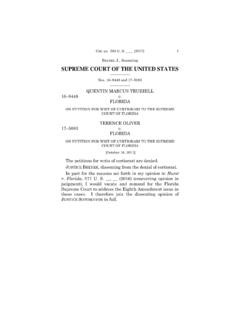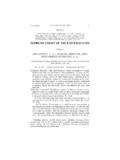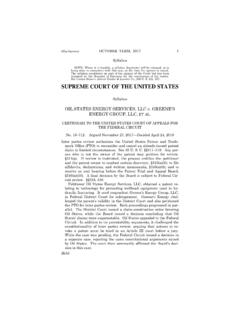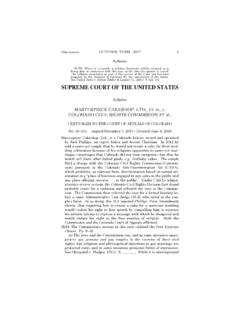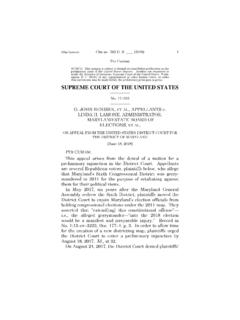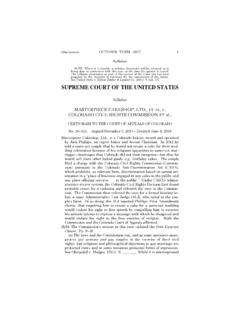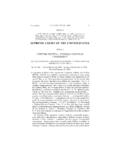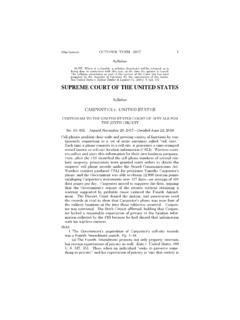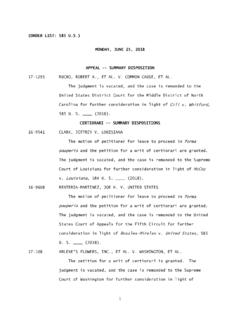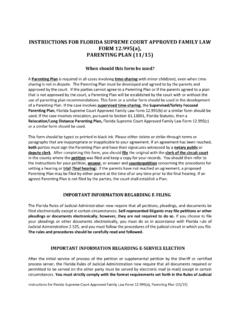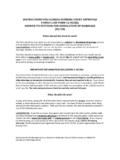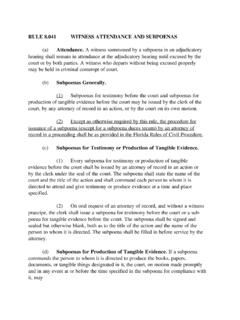Transcription of SUPREME COURT OF THE UNITED STATES
1 1 (Slip Opinion) OCTOBER TERM, 2017 Syllabus NOTE: Where it is feasible, a syllabus (headnote) will be released, as isbeing done in connection with this case, at the time the opinion is syllabus constitutes no part of the opinion of the COURT but has beenprepared by the Reporter of Decisions for the convenience of the reader. See UNITED STATES v. Detroit Timber & Lumber Co., 200 U. S. 321, 337. SUPREME COURT OF THE UNITED STATES Syllabus florida v.
2 GEORGIA ON EXCEPTIONS TO REPORT OF SPECIAL MASTER No. 142, Orig. Argued January 8, 2018 Decided June 27, 2018 This original action concerns the proper apportionment of water from an interstate river basin. Three rivers form the heart of the Basin. The Chattahoochee and Flint Rivers begin near Atlanta, flow south through Georgia, and ultimately converge at Lake Seminole, justnorth of florida , where the Apalachicola River begins and flows 106miles south into the Gulf of Mexico. In 2013, florida , the down-stream State, sued Georgia, the upstream State, asking the COURT to issue a decree equitably apportioning the Basin s waters.
3 The COURT agreed to exercise its original jurisdiction and appointed a SpecialMaster. The UNITED STATES declined to waive its sovereign immunityfrom suit in the case. After conducting lengthy evidentiary proceed-ings, the Master submitted a Report recommending that the Courtdismiss florida s complaint. That recommendation, the partiesagree, turns on a single issue namely, whether florida met its ini-tial burden in respect to redressability. The Master concluded that florida failed to make the requisite showing because it did not pre-sent clear and convincing evidence that its injuries could be redressed by a decree capping Georgia s upstream water consumption if the de-cree does not also bind the Corps.
4 florida has filed exceptions to theMaster s Report. Held: 1. The Special Master applied too strict a standard in concludingthat florida failed to meet its initial burden of demonstrating thatthe COURT can eventually fashion an effective equitable 10 18. (a) Where, as here, the COURT is asked to resolve an interstatewater dispute raising questions beyond the interpretation of specificlanguage of an interstate compact, the doctrine of equitable appor-tionment applies. In this realm, several related but more specific 2 florida v.
5 GEORGIA Syllabus sets of principles guide the COURT s review. First, both Georgia and florida possess an equal right to make a reasonable use of the wa-ters of the Flint River. UNITED STATES v. Willow River Power Co., 324 U. S. 499, 505. Second, when confronted with competing claims to in-terstate water, the COURT s effort always is to secure an equitableapportionment without quibbling over formulas. New Jersey v. New York, 283 U. S. 336, 343. Third, in light of the sovereign status and equal dignity of STATES , a complaining State s burden is much greater than the burden ordinarily shouldered by a private partyseeking an injunction.
6 Connecticut v. Massachusetts, 282 U. S. 660, 669. Among other things, it must demonstrate, by clear and con-vincing evidence, that it has suffered a threatened invasion ofrights that is of serious magnitude. Washington v. Oregon, 297 U. S. 517, 522. And to the extent the COURT has addressed the initial burden a State bears in respect to redressability, the COURT has saidthat it should be clear that [the complaining] State has not merely some technical right, but also a right with a corresponding benefit asa precondition to any equitable apportionment.
7 Kansas v. Colorado, 206 U. S. 46, 102, 109. An effort to shape a decree cannot be a vain thing. Foster v. Mansfield, C. & L. M. R. Co., 146 U. S. 88, 101. Fi-nally, because equitable apportionment is flexible, not formula-ic, this COURT will seek to arrive at a just and equitable appor-tionment of an interstate stream by consider[ing] all relevant factors, South Carolina v. North Carolina, 558 U. S. 256, 271, in-cluding, inter alia, physical and climatic conditions, the consump-tive use of water in the several sections of the river, the character and rate of return flows, the extent of established uses, the availabil-ity of storage water, the practical effect of wasteful uses on down-stream areas, [and] the damage to upstream areas as compared tothe benefits to downstream areas if a limitation is imposed on the former.
8 Colorado v. New Mexico, 459 U. S. 176, 183. Because all relevant factors must be weighed, extensive and specific factual find-ings are essential for the COURT to properly apply the doctrine of equi-table apportionment. See Nebraska v. Wyoming, 325 U. S. 589, 618. Pp. 10 15. (b) The Special Master applied too strict a standard when he de-termined that the COURT would not be able to fashion an appropriateequitable decree. The Master referred to this as a threshold show-ing. But it is threshold only in the sense that the Master has not yet determined key remedy-related matters, including the approxi-mate amount of water that must flow into the Apalachicola River in order for florida to receive a significant benefit from a cap on Geor-gia s use of Flint River waters.
9 Unless and until the Special Master 3 Cite as: 585 U. S. ____ (2018) Syllabus makes the findings of fact necessary to determine the nature andscope of likely harm caused by the absence of water and the amount of additional water necessary to ameliorate that harm significantly,the complaining State should not have to prove with specificity the details of an eventually workable decree by clear and convincing ev-idence. Rather, the complaining State should have to show that, ap-plying the principles of flexibility and approximation, it is likely toprove possible to fashion such a decree.
10 To require clear and con-vincing evidence about the workability of a decree before the COURT or a Special Master has a view about likely harms and likely amelio-ration is, at least in this case, to put the cart before the horse. Pp. 15 18. 2. The COURT reserves judgment as to the ultimate disposition of this case, addressing here only the narrow threshold question theMaster addressed below namely, whether florida has shown that its injur[ies can] effectively be redressed by limiting Georgia s con-sumptive use of water from the Basin without a decree binding theCorps.
